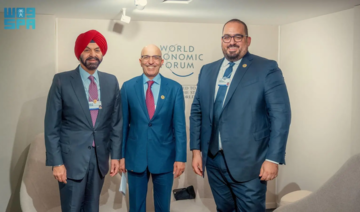RIYADH: Saudi Arabia’s active participation in the World Economic Forum underscores its commitment to advancing global initiatives aimed at enhancing the digital economy, fostering innovation, and leveraging artificial intelligence, a senior official has stated.
Minister of Communications and Information Technology Abdullah Al-Swaha emphasized that the Kingdom’s presence at the annual Davos meeting, held from Jan. 20 to 24, comes at a pivotal moment as the world transitions from the digital age to the era of artificial intelligence.
Saudi Arabia’s participation aligns with its National Strategy for Data and AI, which seeks to position the country among the top 10 nations on the Open Data Index and the top 20 in peer-reviewed data and AI publications by 2030.
The strategy also aims to attract SR30 billion ($7.9 billion) in cumulative foreign direct investment and SR45 billion in local investment in data and AI by the same year.
In a statement to the Saudi Press Agency, Al-Swaha noted that the forum offers a global stage to showcase the Kingdom’s developmental, economic, and technological progress under the framework of Vision 2030.
He highlighted Saudi Arabia’s collaboration with the international community to harness AI as a vital tool for propelling sustainable development and achieving shared global objectives.
He underlined that these endeavors aim to enhance quality of life, bolster the digital economy, and generate fresh employment opportunities across diverse sectors, all contributing to a sustainable and prosperous future for everyone.
Earlier this month, the Ministry of Communications and Information Technology, in collaboration with King Abdullah University of Science and Technology and consultancy firm Hello Tomorrow, released a report highlighting Saudi Arabia’s advancements in deep technology.
The report revealed that up to 50 percent of the Kingdom’s deep tech startups are focused on developing artificial intelligence and the Internet of Things. It also noted that more than 43 high-growth startups in Saudi Arabia collectively secured over $987 million in funding by 2022.
The funding surge was attributed to a rapidly expanding investment ecosystem, which ranked among the top three in the Middle East and North Africa for funding volume and deals.
In September 2024, an analysis by global consulting firm Strategy& Middle East projected that Saudi Arabia’s technology sector could achieve an SR15 billion increase in operating profit by 2028 through the adoption of generative AI.
The study suggested that a 15-percentage-point margin growth is attainable if technology companies capitalize on the demand for advanced hardware and infrastructure while developing and commercializing new generative AI use cases.

























